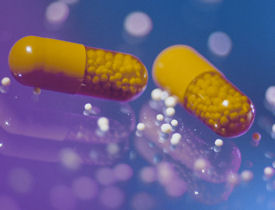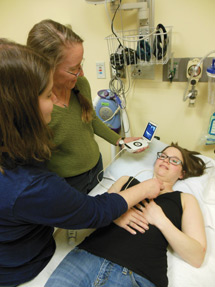Doripenem not for pneumonia; migraine device approved
This update covers a labeling change for doripenem (Doribax) and a warning about risk of death for ventilator patients with pneumonia, among other regulatory actions.
Recalls, warnings and label changes
A labeling change for doripenem (Doribax) warning about risk of death for ventilator patients with pneumonia. The drug increases risk of death and lowers clinical cure rates compared to use of imipenem and cilastatin for injection (Primaxin). Doripenem is not approved to treat any type of pneumonia. It is still considered safe and effective for its FDA-approved indications of complicated intra-abdominal infections and complicated urinary tract infections, including pyelonephritis.

An urgent labeling change on Thoratec Corporation's HeartMate II LVAS Pocket System Controller because some patients and caregivers have experienced difficulties changing from a primary system controller to their backup system controller. These difficulties have resulted in 4 deaths and 5 reports of loss of consciousness or other symptoms of hypoperfusion. Physicians who prescribe the device should immediately review the updated labeling and training materials with all clinical personnel responsible for training patients and caregivers on the use of the device. All patients and caregivers using the device should be retrained and provided updated Patient Handbook information.
A recall of the ISIS HVT tracheal tube (cuffed with subglottic secretion suction port) because it may kink during use. If a tracheal tube kinks, it can deprive the patient of adequate ventilation and cause serious injury.
A recall of 1 lot of acetylcysteine solution 10% by Ben Venue Laboratories due to the discovery of a single visible glass particle in a vial in the lot.
A recall of Philips Respironics' Trilogy ventilator to address a potentially defective component on the power management board, which could affect the function of the device. If this issue is not corrected, it is possible that the ventilator may fail to deliver mechanical breaths and that the alarm functionality may be compromised.
A recall of 10 lots of etomidate injection 2 mg/mL 10 mL and 20 mL by Agila Specialties due to the presence of particulate matter and/or illegible and missing lot numbers and/or expiry date.
A recall of 1 lot of Baxter's DIANEAL PD-2 peritoneal dialysis solution with 1.5% dextrose 6,000 mL (Ambu-Flex II) as a result of complaints of particulate matter, identified as mold, resulting from a leak in the container.
A recall by Pfizer of 2 lots of Effexor XR (venlafaxine HCl) 150-mg extended-release capsules and 1 lot of Greenstone's venlafaxine HCl 150-mg extended-release capsules because a pharmacist reported that a bottle of Effexor XR contained 1 capsule of dofetilide (Tikosyn) 0.25 mg.
A recall of certain lots of Medisca's L-citrulline product after testing indicated that samples contained N-acetyl-leucine and no L-citrulline.
A recall of an ACME Monaco guidewire (.035x150 3MMJ TCFC) due to potential for the coating to flake off the wire.
A recall of standard offset cup impactors by Greatbatch, Inc., because the sterilization recommendation in the instructions does not meet requirements for sterility assurance. No incidents have been reported, but improper sterilization has the potential to result in surgical infection.
Approvals
Cefaly, the first preventive treatment device for migraine headaches. It is a small, portable, battery-powered device that resembles a plastic headband worn across the forehead, which applies an electric current to the skin and underlying body tissues to stimulate branches of the trigeminal nerve. It should only be used once per day for 20 minutes. Approval was based on a study of 67 patients with frequent migraines in which device users experienced significantly fewer days with migraines per month and used less migraine attack medication than those who used a placebo device. A patient satisfaction study found that 53% of patients were satisfied and willing to buy the device. The most commonly reported complaints were dislike of the feeling and not wanting to continue using the device, sleepiness during the treatment session, and headache after the treatment session.
Droxidopa (Northera) to treat neurogenic orthostatic hypotension. Approval was given under the accelerated approval and orphan drug programs, based on 2-week trials in which patients reported decreases in dizziness, lightheadedness, feeling faint, or feeling as if they might black out. The drug carries a boxed warning about the risk of supine hypertension. Patients must be reminded to sleep with their head and upper body elevated, and supine blood pressure should be monitored before and during treatment and more frequently when increasing doses. The most common adverse events were headache, dizziness, nausea, hypertension, and fatigue.
Metreleptin for injection (Myalept) to treat the complications of leptin deficiency, in addition to diet, in patients with congenital generalized or acquired generalized lipodystrophy. Safety and effectiveness of this leptin analogue were evaluated in a study of 48 patients, which showed reductions in HbA1c, fasting glucose, and triglycerides. Risks include anti-drug antibodies, and T-cell lymphoma has been reported in patients with acquired generalized lipodystrophy, both treated and not treated with the drug. Because of these risks, metreleptin is available only through a Risk Evaluation and Mitigation Strategy Program. The drug is contraindicated in patients with general obesity and is not approved for use in patients with HIV-related lipodystrophy or metabolic disease, including diabetes mellitus and hypertriglyceridemia, without concurrent evidence of generalized lipodystrophy. The most common side effects were hypoglycemia, headache, decreased weight, and abdominal pain.



